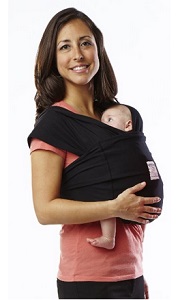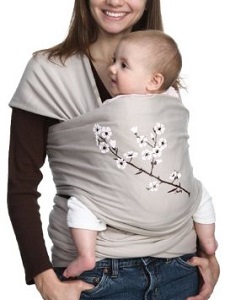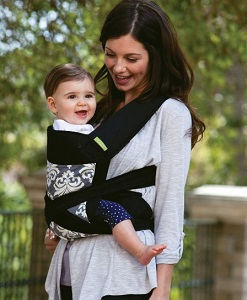
|
|||||
|---|---|---|---|---|---|

|
|||||
Popular Articles: |

Baby K'tan Baby Carrier |
This generation is on the go . . . witness the sale of boats, campers and trailers. And, like their parents, babies are also on the go
. For today's mobile babies, the trend is towards the light-weight, the portable, the convertible. Some parents find even quick-fold strollers inhibit their mobility. They report a back-pack is the best way to transport baby, for it is both convenient and comfortable. True advocates don't mind carrying a toddler who weighs close to 30 pounds. Back-packers begin to carry their infants as soon as baby can hold his head steady.
But what about babies too young for a back-pack? The cozy front-pack came into its own in the late 1970's. Many mothers, often those who breast-feed their babies and believe in natural childbirth, point out carrying a newborn in a soft front-pack keeps her baby close to their heart, where the baby can hear her heart-beat and feel her warmth. And a cuddled baby is often a quiet baby.
Baby carriers provide the freedom you need as a busy parent, the freedom to go shopping or travel on the bus or subway. The freedom to be more active and less frazzled.
For the mother with an older child, a baby carrier has a dual purpose: it quiets her baby when she is cranky, while giving mother the freedom to do things with her older child . . . at the same time. Baby can sleep while mother takes her older child to the park. Or mother can take both children out walking or bus riding, with baby safely nestled in a baby carrier. And mother's both hands are free for helping her other child. With a baby carrier, you can comfortably take your baby anywhere. Babies in carriers often fall asleep in otherwise strange surroundings. A formally hectic time thus turns into a happy, unharried experience for all concerned.

Moby Wrap Organic Baby Carrier |
Baby carriers have evolved from use in cultures where freedom of action is a necessity, where there are no baby-sitters and both parents must work. In these cultures, babies are not confined to cribs but are carried everywhere. Introduced to the world from the safety and familiarity of a secure carrier, close to their parents. Among the Indians of Guatemala, the mothers go back to their usual activities shortly after birth. Where-ever they go, and what-ever they do, they carry their babies on their backs in slings that allow easy breast-feeding.
American pediatricians, familiar with the frequency of colic, fretfulness and unexplained crying in Western countries, were amazed to find no evidence of any of these disturbances in the Guatemalan babies. They saw no spontaneous belching, despite the mother's failure to bring up bubbles. They speculated the babies' comfortableness was a result of the constant motion or closeness to their mother's body, or both.
The researchers noted the babies seemed to be quite mature for their age and were given credit for being older . . . due to their mature facial expressions.
The babies also did not seem to be afraid or shy of strangers, at the usual periods of shyness seen in Western infants.
The researchers add the infants in the baby carriers look around and participate in the whole world of experience of the mother, who is often explaining and interpreting what she sees, even to a month-old infant.
Equally important, their mothers and fathers continue to function as people with interests and careers, people who can be parents without sacrificing their identities.

Infantino Sash Mei Tai Carrier |
Pediatricians note either carry position (on the parent's front or back) is correct orthopaedically for baby, and comfortable for mother.
A Los Angeles sociologist writes, the new baby is soothed by the feel of its mother's body. The familiar sound of her heart-beat may be an important factor in relieving anxiety when baby encounters new places, people and situations.
Dr. Spock writes, it seems that in Western industrial societies like ours, we have somehow managed to remove most of the closeness between mother and baby that comes naturally in simpler places. We've invented plastic infant seats so that when babies are moved about, they don't have to be carried in the parents' arms and stationary cribs with firm, flat mattresses. What a contrast there is between these cribs and the frequent movement and warm contact when babies are held by slings against their mother's bodies . . . if it's true, as the accumulated evidence seems to suggest, that movement and bodily closeness are good for babies, especially in the earliest weeks . . . we've been ingenious and consistent in depriving them of these sensations
.
Dr. Spock goes on to say, I suggest that instead of using a plastic seat for carrying babies from place to place (when shopping and visiting) and for keeping babies more contented when they are bored, tired or colicky, parents substitute the use of slings or carriers that hold the baby close to the parent's body . . .
and experiment with carrying baby at other times too.
The basic reason for the baby carrier's success must be related to the feeling of security passed from the mother to child, and contentment returned by baby to mother.
Jean Liedloff states, in The Continuum Concept, once a mother realizes that
carrying her baby . . . about for the first six to eight months will ensure baby's self-reliance and lay the foundations for baby becoming social, undemanding and positively helpful . . . even her self-interest will tell her not to spare herself the 'trouble' of carrying her baby while she is doing the housework or shopping.
In addition to their everyday utility, baby carriers revive some of the essential experiences of parenting that have been lost in modern society. Touching between parents and children is crucial, shared experiences develop a child's sense of security and, in spite of the push and hurry of today's world, families can still be close.
This article compliments of Born to Love.
Send questions, comments, and suggestions to: catherine@borntolove.com
Born to Love articles are written by Catherine McDiarmid-Watt
Born to Love is a participant in the Amazon Services LLC Associates Program, an affiliate advertising program designed to provide a means for sites to earn advertising fees.
NOTE: All logos, company names, brands, images, trademarks and other intellectual property are the property of their respective owners.
Born to Love is a participant in the eBay Partner Network, an affiliate advertising program designed to provide a means for sites to earn advertising fees by advertising and linking to eBay.com.
Copyright © 1978 - BorntoLove.com - All Rights Reserved.
Last updated - April 5, 2024